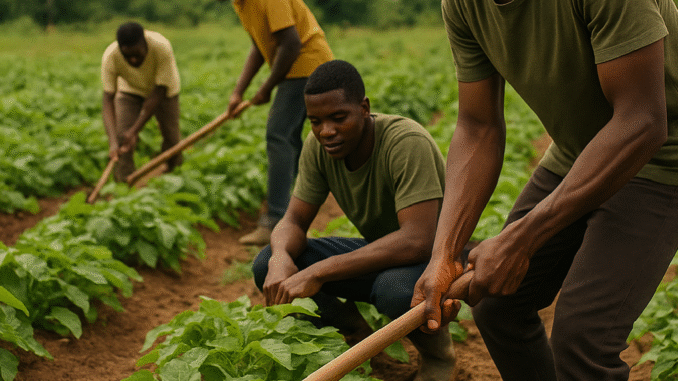
I am usually reticent about sharing stuff on social media, but this article covers a subject matter that has been dear to my heart for a very long time.
While this great writer focuses on the desertion of our agricultural sector by our youths in search of get rich quick schemes and criminal enterprises, we face a more serious crisis in the epidemics of drug addiction that is stealing away the future of our youths.
All over Yorubaland from the cosmopolitan urban centers to the nooks and crannies of our rural communities, one is confronted with gangs of young men drinking alcohol in sachets, sniffing and smoking drugs and other hallucinogens.
On a recent trip to my Ilesa hometown, walking through the streets I once walked as a young lad eons ago, I was confronted in virtually every corner by large gathering of young men, including teenagers, sucking on, sniffing and smoking alcohol in sachets, all kinds of drugs and other hallucigenics, wasting away their lives.
We are in a crisis mode and no one seems to be doing much about it. We are losing our boys and in the process we are tearing apart the fabric of our family and society.
Single parenthood and unmarried mothers which once considered a social blight is vastly becoming the norm in our society.
It is the reason, the Ijesa Diaspora Community is organizing a development symposium as part of the coronation ceremony for our Kabiyesi, His Imperial Majesty Owa Clement Adesuyi Haastrup, Ajimoko III, the Paramount king of Ijesaland, at the Royal Hotel and Resort in Iloko on May 22nd.
One of the key subject matter on which we have invited lead speakers and discusants is “Reimaging Ijesaland Development: Reorienting Ijesa Youths from the obstacles to the driver of sustainable development.
I urge us all to read this article for an in-depth exploration of arguably the most serious existential threat that confronts Yoruba community in particular and Nigeria at large, a disillusioned generation of youths who have lost hope in the future.
We as a society has de-prioritized investment in the education and provision of a pathway to sustainable livelihoods for our youngsters.
We have sown the wind and very soon we will be harvesting the whirlwind.
We are sitting on a demographic ticking time-bomb.
Wale Alonge
Oladeinde Olawoyin wrote:
“Penultimate weekend, I drove from Osogbo through Owode-Ede, Ode-Omu, Gbongan, Ikire, and the dozens of villages in-between and realised that there is something eerily disturbing about agric practice and the changing structures of the economies of some of our towns, especially in Western Nigeria.
Whenever I am embarking on road trips, I stop quite often, midway between villages, to feel the pulse of the people, buy from and interact with (agric) produce suppliers and off-takers, observe the structure of the local economy, and pick important lessons where necessary. Last week was no exception and the lessons are as poignant—-as they appear somewhat worrisome.
From the trip, just as in my movements across (Western) Nigeria on finance/business and economy reporting duties in recent years, two things became quite noticeable: i. First off, young people are increasingly playing negligible—-almost non-existent—-role in the agric value chain in our towns and villages, even in the heavily agrarian ones.
ii. Alternatively, in many of these communities, young people (that haven’t Japa-d to the city, anyway) have created an “economy” that operates mostly like an Island, far-detached from the soul of the traditional (“orthodox”) economy——which ideally feeds into, or draws breath from, agric produce and practices. Think night clubs. Think gamble spots. Think internet scam and the burgeoning O.S (Not “Operating System” o!) ecosystem. Think lounges. Think beer parlours. Think of all things carnal and reckless, or greed-driven, like yahoo-plus and CBEX. A vibrant, bubbling “economy” powered entirely with illicit money, sex, and alcohol, from Lalupon through Ile-Ogbo, from Iragbiji through Offa and ErinIle.
And so, from ikirun through to the smallest hamlet along Osogbo-Gbongan road, young ones are running away from the farms (and from apprenticeship) in search of quick money. But it’s not even an Osun thing, anyway. It’s same everywhere I have gone to understand the changing structures of rural economies and the underlying drivers of food inflation (insecurity, rural-urban migration, declining interest in agric practices) across Yorubaland—-Oyo, Ondo, Ogun, Ekiti, all the way to Kwara. In effect, the wild popularity—-and eventual collapse—-of CBEX among young “investors” isn’t that difficult to diagnose, especially in Western Nigeria.
The downside of this is that even in areas we should tap into young peoples energy, education, and travel experience/insights to develop expertise in mechanised, innovative farming practices for abundant food and wealth creation, we are missing out.
Rather, we have a culture of young folks desperate to gather quick wealth—-without enterprise. I noticed how this played out, subtly, in the recent surge in Cocoa prices but hope to tell a better story in a more comprehensive, journalistic report I am working on.
In its latest report for March 2025, the NBS said food inflation on a year-on-year basis was highest in Oyo (34.41%), Southern Nigeria’s largest state with a landmass of 28,454 square kilometres, which used to boast of heavy agrarian population (Oyo North)!
Now, the underlying factors are structural, and we all have a share of the blame—-from a do-nothing government through to fawning community leaders and everyone in-between. But I am particularly worried about the changing structure of the “rural economies” in Western Nigeria, and how a culture of “K’emi sha ti l’owo”—as trumpeted by 9ice and his disciples—-drives us through this pathway to collective doom, while we all look away.
The results are here already——food inflation/insecurity; scam/fraud; glorification and wild popularity of ponzi schemes; rush for fast, quick money; absence of innovation in agric practices, etc. Tick… tock…”
Spoke my mind.

Leave a Reply